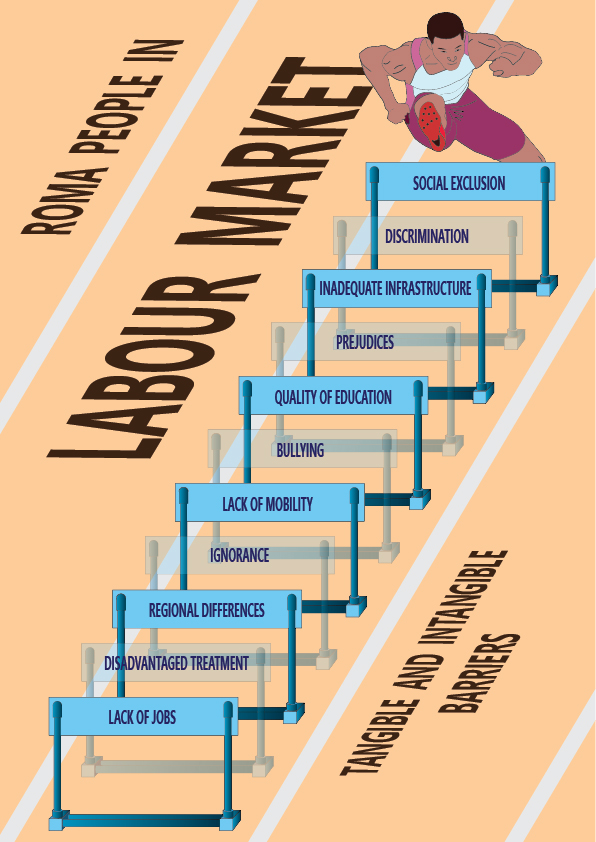RARE - PILOT INTERVENTIONS IN ROMA EMPLOYMENT
01-09-2019
"J & I" Accounting agency: Željka, a young 29-year-old Roma, has decided to increase her qualifications and not just stay in hairdressing. With her full secondary education and high school graduation she practices in an accounting company. Her secondary school of economics gives her a good foundation to gain practical experience. After completing her internship at the "J&I" Accounting Agency, she finds herself as an accountant, or she decides, more courageously, to start her own business and to be independent.

The Roma Inclusion Office of the Autonomous Province of Vojvodina and the Know How Centre, NGO from Novi Sad started implementation of the Pilot project named „On the job training“ for unemployed Roma people from the tritorry of AP Vojvodina in February 2019.
Our pilot intervention aimed at creating a method for the dignified inclusion of Roma into the labour market by targeted provision of employment services: tailor-made trainings, retrainings, induction courses and practical tutoring. Vocational training for the working inclusion of Roma in Serbia also includes intercultural activities and activities for the self-improvement and strengthening of their own pride and dignity.
The total number of Roma taking part in trainings and preparation for employment during the pilot project was 30, on 5 locations: Novi Sad, Kanjiža, Apatin, Sombor and Subotica.
Based on the public call, we targeted and selected 14 private and public companies. The selected companies conducted on the job trainings in their workrooms in accordance with the pre-defined training program. In implementation of the trainings, the companies are technically and financially supported by the Roma Inclusion Office.
Roma are the most vulnerable of all, discriminated on several grounds, and for their successful inclusion there is no universal model or prescribed recipe. However, there are certain ingredients, which proved to be necessary in supporting their long-term socio-economic inclusion.
It is needless to say that all areas are interrelated and cannot be addressed separately. For instance, the level of education and professional training influence the possibilities of employment and, in turn, employment allows for improvements in living standards, including changes in housing conditions, access to education and healthcare. Therefore, inter-linkages between each area need to be taken into account as a part of integrated approach to the inclusion of Roma.

It has been evident for some time that the problems concerned with the effective labour market integration of Roma are multi-dimensional and action is needed on several fronts. The problem is not just high unemployment rate among Roma, there is also the issue of the quality of employment.
From our opinion, one more crucial ingredient of success that needs to be underlined it is partnership at all levels and between various stakeholders. The only way that inclusion can be supported, leading to greater durability and sustainability, is through partnerships: between different levels of government, government and civil society, international organizations and government, government and private sector, etc. For example, Roma Inclusion Office is the public body established by the AP Vojvodina Government, and the Know How centre is NGO with years of experience in inclusive development and work with Roma. Beside them, the working group of most relevant actors was established as consulting body that provides ongoing support and is involved in creation of the Roma Employment Action Plan in AP Vojvodina. For the first time, we involved a business sector and that helped us to see how they see Roma and how we can improve their cooperation with them. In consultation with them, our pilot project measures have been adapted and that way helped both employers and Roma themselves to become more easily involved in the labour market.
Within the RARE project and in order to ensure comprehensive approach to the identified problems, the focus was on the practical performance of the project in the filed with the Roma community. During the pilot, Roma people gain practical skills in private companies, public administration and self-government organizations in areas of: hotel services, working with wood in the forest, accounting, flower sales, waste recycling and treatment, security and guard services.
The prejudices toward Roma people are present among employers but also other non-Roma actors and continual positive promotion and campaign is needed in order to address these issues. Therefore, direct cooperation with local institutions contribute increase of competences and change of negative attitudes among professionals in these institutions (such is National Employment Service).
The activity of the sensitization campaign is a very important component of the project. For the first time, we applied a slightly different approach, which is that we deliberately wanted to show in a positive way our Roma and Roma women who are unemployed and avoid stereotypical images that are repeated about the Roma. This is the first project through which we have had the opportunity to do this, by presenting role models, promo video, and in particular to show the private sector and private employers a positive picture of the Roma, that these are not only people who only live in the worst poverty but people who have their occupations, interests, potentials.
Use of local institutional mechanisms such are Roma coordinators in municipalities and towns (who are employees of local self-government) contributed better targeting and reach out of unemployed Roma.
The greatest practical success and visible result of the project is the achievement of a change at the individual level in Roma people: this personal change concerns their personal attitude towards themselves and their dreams, wishes and ambitions. Of course, a significant personal change is the increase in the skills, knowledge and vocational competence needed to get a job and a job contract. The most obvious changes are examples of new jobs acquired by project clients. All these positive personal changes have an impact on families, the children of clients and the communities in which successful Roma clients live. Successful Roma become positive models for other members of their communities, especially for Roma youth.
The project has confirmed that there are no fast, cheap and universal solutions, obversely, the project confirmed, that the long term strategy is necessary in activities that prove to be beneficial and were tested in this project.
As far as can be ascertained, the project appears to have had a positive impact on the economy and on state finances. It also has plausibly contributed to the reductions in long-term unemployment of the hard-to-employ persons, which is the most problematic aspect of the labour market. Moreover, a key strength of the project has been its ability to adapt to identified needs.
All in all, the approaches and methodologies used can present useful platform for addressing multiple concerns of Roma men and women that are all related and mutually supporting. RARE project tapped close connections between economic (employment), social (access to services), political (discrimination) and institutional (provision of services) spheres that are hindering their full inclusion.
